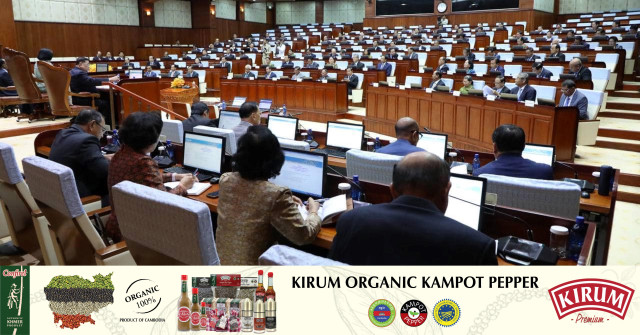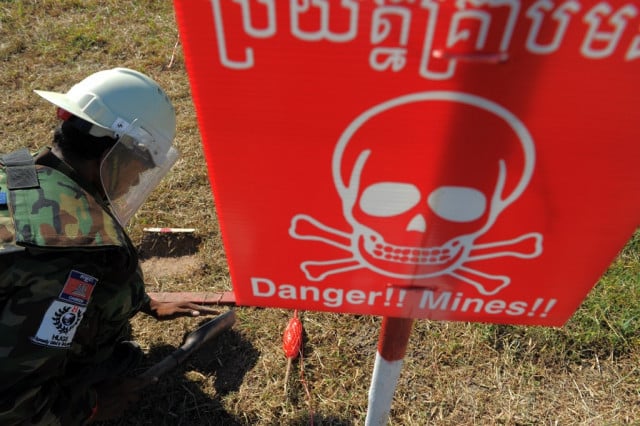Opinion: Is Cambodia Ready for E-Parliament?

- By Pheng Thean
- February 25, 2024 1:00 PM
Cambodia is currently at a crossroads where traditional practices meet innovation. The introduction of e-parliament has become a key factor in driving transformative changes in the parliamentary landscape.
As a developing country, Cambodia is striving to modernise its parliamentary processes by integrating information and communication technologies (ICTs). This includes law-making, representation, and oversight. The country is looking to establish a modern e-parliament that can keep pace with the evolving world.
Looking back in time, when Estonia—which has now had the current e-parliament leading model—gained independence from the Soviet Union, Cambodia was dealing with the aftermath of a long civil war caused by the Cold War. Recognising the potential of new digital technologies, Cambodia's government aimed to use ICTs to bring innovation and improve the relationship between the government and society.
Hence, considering that Cambodia's ICTs market is moderately competitive and trending towards fragmentation with numerous significant players, venturing into e-parliament presents an opportunity, but it may not be entirely secure at this point. Despite the optimism brought by Cambodia's current Digital Government Policy 2022-2035 and its overarching Industrial Policy, the transition faces persistent challenges in swiftly integrating ICTs into parliamentary operations. While the potential is recognised, the extent to which it can be effectively implemented remains uncertain. The practical implementation of such strategies raises questions about their feasibility.
It is interesting to note that parliamentary staff members use computers more often than Members of Parliament (MPs) for their day-to-day tasks. The duties of parliamentary assistants and staff entail the use of ICTs for managing financial controls, delegation programmes and conducting online background research through the Internet.
Against this backdrop, Cambodia needs a concerted effort to effectively transit Cambodia for the current shift towards ICT-related parliamentary functions. Governments shall consider which model to follow and transcend it to what fits best for Cambodia’s current situation. This might pose the question: what is e-parliament for Cambodia? Simply put, MPs can start executing from a fundamental level by introducing ICTs into the parliament itself while embracing progressing uses and adoption. As legislature includes law-making, representation, and oversight, Cambodia shall consider as following:
In terms of improving the law-making process, Cambodia needs to focus on improving its digital resources to support parliamentary committees. This involves ensuring that there is an adequate supply of laptops and other computer equipment in parliamentary settings and at the same time, facilitating a smooth transition in digital literacy for parliamentary members. Taking inspiration from Estonia's approach, Cambodia has the potential to improve its parliamentary processes by providing MPs with necessary information before draft meetings. Given Cambodia's current stage of development, it is well-positioned to build the necessary capacity and ensure the successful implementation of such practices.
The lessons learned from some of the ASEAN counterparts have revealed potential challenges. For example, in Indonesia, the Parliament allocates a significant budget of $4,000 per month for nearly 1,000 PCs with internet access. However, the practical implementation faces hurdles due to slow internet connections, and as a result, many MPs choose private Internet Service Providers instead of the official system. This highlights the importance of not only investing in digital infrastructure but also ensuring its efficiency for parliamentary operations.
The country must now focus on implementing the representation aspect of the e-parliament. To ensure effective public information dissemination and tracking, it is vital to utilise ICTs and implement information systems. Drawing inspiration from Denmark's 1997 initiative, the aim should be to make parliamentary documents easily accessible to the public, business sector, and media. Cambodia can adopt similar strategies in e-parliamentary processes, such as creating user-friendly websites and accessible information hubs that cater to the needs of the youth and citizens. Such initiatives can foster a culture of transparency and accountability, empowering individuals to access relevant information for research and contribute to a more informed and engaged citizenry.
Finally, establishing robust oversight mechanisms through data-driven networking is a crucial aspiration for Cambodia, and this demands careful preparation. While the creation of databases and intranets for monitoring executive activities may pose significant challenges, the implementation of such a strategy holds the potential to elevate Cambodia's digital parliamentary system. By examining our neighbouring country, the Thai Parliament which was once actively engaged in hosting the second International Parliamentarians Association for Information Technology (IPAIT) in Bangkok in 2004, Cambodia should consider revitalising its approach and explore the implementation of oversight data. Oversight functions can be carried out through committees or a parliamentary ombudsman, providing citizens with channels to voice their concerns. Taking India’s path, online information can help MPs evaluate the performance of ministries. Therefore, Cambodia's main challenges are infrastructure, policy framework, and the need for awareness and capacity development that is tailored to its specific context. Cambodia could enhance its international visibility by promoting its e-parliamentary processes and projecting a positive image of its progress in parliamentary practices.
The decision on which model to adopt for e-parliament lies with Cambodia. However, it is important to recognise that there is no one-size-fits-all solution. Members of Parliament can consider a blend of approaches that prove most effective and practical for the well-being of society, yielding tangible and efficient outcomes. To sum up, Cambodia is at a crucial point, navigating between tradition and innovation as it embraces e-parliament. Whether fully prepared or not, it is time to expand this ambition since the evolving global landscape of e-parliament will likely gain wider recognition in the years to come.
Pheng Thean is a research intern at the Mekong Centre for Strategic Studies (MCSS) of the Asian Vision Institute (AVI) and an intern at the Centre for Southeast Asian Studies (CSEAS) of the Institute for International Studies and Public Policy (IISPP). The opinions expressed are those of the author and do not represent the views of his affiliations.















